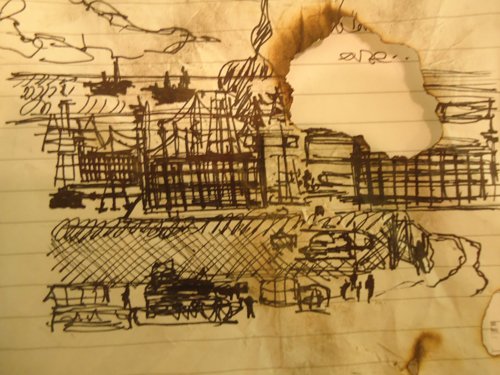
The Birkenhain Journal: May
5/1/14
There isn’t much to do but sit and wait. We keep the ship running smooth and follow orders, but it’s not nearly the arduous regimen we had back home. It would feel like a break, almost, if we weren’t all nearly breathless with fear. Even the Lischke sister can’t manage to crack a joke today.
I learned one interesting thing, though—as it turns out, Radnitz and I are related. Not by blood, but by marriage. His cousin is my uncle’s sister-in-law. Who would have guessed?
5/2/14
We’ve safely arrived at the port. The UK has it secured, but the American military isn’t easily giving it up. I could hear the sounds of battle as we left the safety of our ship. Right now, there are enough forces to push the Americans back, so they’ll be keeping us out of the battles until they need us. It’s a problem, though—most of us don’t have a common language. Quite a few speak English, but my grasp of it is shaky at best and my Spanish is even worse. Fortunately, one of the commanders speaks German.
5/5/14
Our mission is to take the refinery and keep it occupied. Mercifully, the front lines are miles off, thanks to the UK soldiers who arrived before us. Commander Rojas has been translating for us, letting us know what the situation has been. The oil around Corpus Christi is still plentiful, but many of the oil fields further south have begun to run dry. Mexico doesn’t have enough oil to trade with the entire globe. Drug wars in the capitol have forced their military to split attentions between the invasion of the Gulf and protecting their own citizens. It’s no wonder they needed help so desperately. Even the crisis cannot compare to what they suffer here.
5/8/14
Rojas isn’t as secretive as our own higher-ups. He told us the strategy outright—and what a marvel of simplicity it is! The Americans have technology and resources on their side, but we have numbers. We’ll start by taking the Gulf, city by city, and claim their oil. Meanwhile, other forces are pressing down on them on all shores and borders. The Americans have too many enemies and they’re too stubborn to surrender. It’s a classic flanking strategy, cutting off all their escape routes and slowly reining them in until they have nowhere to go. Corpus Christi is only the beginning, but they’re so distracted by other invaders they won’t even notice the loss of a single refinery. Little do they know how we’ll swarm them in the end.
5/9/14
They’ve pushed through a gap in the UK forces and now they’re upon us. Our defenses are too weak—this is a refinery, not a fort. We can’t face them all! Where is the UK? Where is Mexico? Are we alone out here?
5/12/14
Frau Schöenwald is a widow today. It’s strange how little we would mind the idiocy of the Little Miss now.
5/14/14
I’ve gone deaf, truly deaf, from the sound of war and guns in my ears. All I can hear is a dull, persistent ringing.
5/23/14
The Mexicans and fresh troops from back home have arrived at last. They pushed the Americans out of Corpus Christi again. Finally, I can breathe air clean of gunsmoke and blood. In a way, I see now how fortunate our location was. If it had been anyplace else, they would have bombed us, but they won’t risk destroying their own refinery. They wouldn’t dare use force to take this place back. Soon, they will have no choice but to negotiate and open up a trade with the rest of us, as it all should be.
5/26/14
I’ve started thinking of the money I’ll have to bring home. With the crisis certain to end soon, I won’t have to hoard it all away. If I have enough, maybe I’ll get my ears fixed and then learn how to drive. Radnitz and I, we’ll both visit our family in Dresden.
– Minervan readers of my research will note with pleasure the beginnings of true international collaboration, finding in it ideals we hold dear. If only it had started years earlier, and been reciprocated by the US politico. Unfortunately, the cooperation apparent in the final days before The Collapse, while heartening, would prove too little, too late.